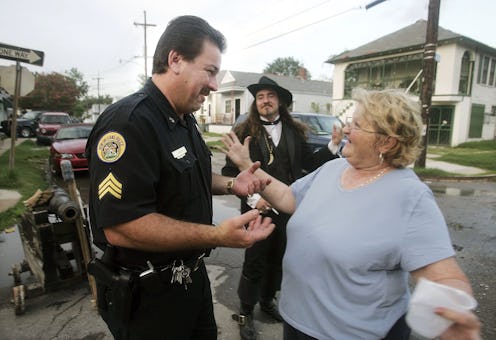On Tuesday night, some Bernie Sanders supporters got on a nationwide conference call to discuss the state of emergency that is structural racism in this country. Among the topics discussed was the nature of policing in the context of both local police departments and immigration, and community policing was presented as a possible solution to police brutality. But is it really a viable solution? There's a lot that would need to happen between a community and the police force before it could be successful.
According to the U.S. Department of Justice, community policing "is a philosophy that promotes organizational strategies that support the systematic use of partnerships and problem-solving techniques to proactively address the immediate conditions that give rise to public safety issues such as crime, social disorder, and fear of crime." In practice, this might manifest in a couple of different ways. Community policing could entail the creation of community police review boards, or it could involve a process by which police officers become more effectively integrated into their communities to ultimately build a sense of trust between them and community members. The latter might look something like this: A police officer who lives in the community or county in which they are working, knows and understands the problems facing that community, attends community events, and gets to know community members.
Programs like Neighborhood Watch try to implement community policing in local communities to keep police departments and community members accountable to one another while encouraging them to work together to solve problems. But as the case of Trayvon Martin revealed, Neighborhood Watch is not infallible. Martin, an unarmed black teenager, was shot dead by George Zimmerman, a neighborhood watch coordinator who followed Martin because he looked "suspicious." At that time, a police department official who had worked with Zimmerman to establish a neighborhood watch program in his community said it was the job of law enforcement, and not civilians involved with Neighborhood Watch, to pursue "suspicious" individuals. So in the end, Neighborhood Watch does not eliminate the discriminatory treatment of marginalized communities that is perpetuated by policing institutions.
Neighborhood Watch does get part of the way toward achieving the ultimate goals of community policing. But for community policing to actually work, structural problems have to be confronted and tackled head-on. For example, if racist police brutality is a significant issue in a specific community — as it is throughout the country — effective community policing would require sincere, open-minded, and frank discussions between law enforcement officials and community members about deeply ingrained institutional racism and other types of institutional violence.
Jerry Wilson, a pioneer of community policing, told TIME during the civil rights movement that the "use of violence is not the job of police officers." He's right, obviously — policing should focus on deescalation over the use of brute force — so why is it so hard to see that in practice?
After Michael Brown was killed by a white policeman in Ferguson, protests erupted in the community and around the country, and law enforcement officials weren't always sure how to respond. Despite Ferguson's predominantly black demographic, its police forces were more than 90 percent white. In short, the people of Ferguson — and in other parts of the country where police brutality has accelerated into the national spotlight — do not see themselves reflected in the police forces that claim to serve and protect them. Additionally, the officers in question do not often have enough of a stake in the communities in which they work to serve them in the best possible way.
For community policing to work, it needs to address the structural issues faced by the community, and as long as law enforcement remains a powerful institution, police officers need to be held more accountable by serving their own communities and developing a sense of respect for the lived experiences of the individuals with whom they must interact.
Images: Getty Images (3)
